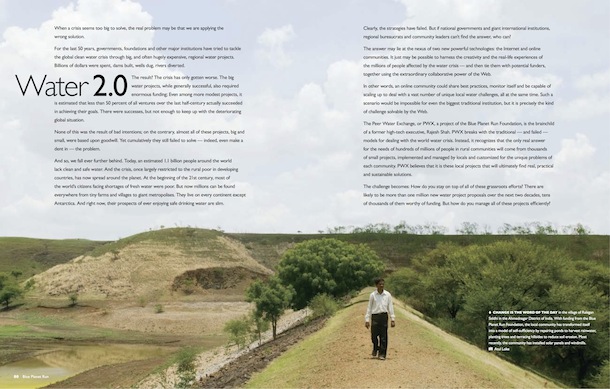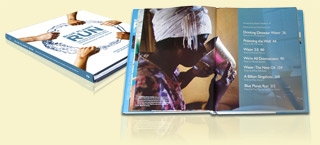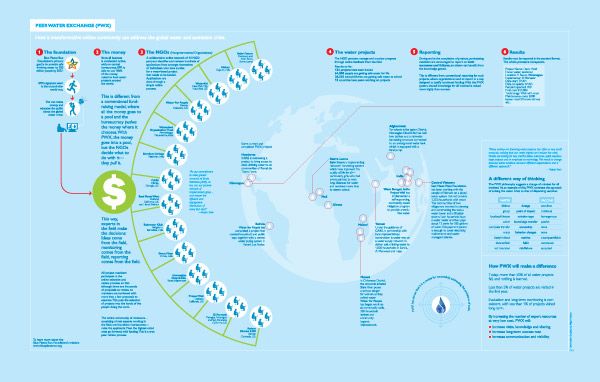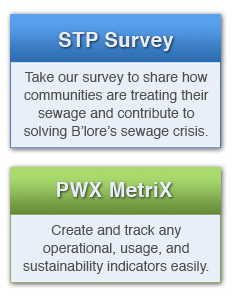Global Crises
Today we see many crises facing humanity globally:
- ~1 billion people lack Safe Drinking Water
- ~2.6 billion people lack Access to a Toilet
- Increased Pollution and Loss of Natural Resources
- Increasing Destitution
- Climate change
- Loss of Biodiversity
All indicators show these crises are becoming worse and our efforts (over decades in some cases like water)
are not effective.
The Problem
Many people and institutions have been working on the water and sanitation crises over the past several decades.
Some of that effort seems ineffective, as it did not produce the results that were needed.
These 'failures' have produced a steady stream of experience, one that is locked up in the heads of many dedicated individuals.
Our current philanthropy system has two problems: one is that all of that experience is not contributing to our knowledge of what works and what does not --
we are unable to report failures and share learnings from those failures.
Unlike a vaccine, successful solutions to the global water crisis are not one-shot, immediate result acts.
They involve community organization, appropriate technology, hygiene, sanitation,
transfer of ownership, change in behaviour, and long-term maintenance.
Integrating these dimensions - one project at a time - is hard, and trying to replicate in other projects is much harder.
The second problem is that our current bureaucratic philanthropic process is not scalable to manage hundreds of thousands of local small-scale projects.
To apply our collective knowledge, to unleash all available resources, and to provide an outlet for our passion in a non-traditional way that promises results,
we need to first change our mindset to overcome deep-rooted roadblocks in our Philanthropy 1.0 system.
PWX creates a new mindset and model - Philanthropy 2.0 - that collaboratively, efficiently, and verifiably
destroys our roadblocks, empowering us to solve humanity's crises.
A Reality CheckClick to display
Probably, more than 50% (closer to 80%) of projects conducted around the world fail within a year after 'completion'.
Our friend in Vietnam informed us of the 80+% failure rate of a large international agency's projects.
Another friend made a surprise visit to his projects in Mozambique and found 80% of the ones he visited had failed (or no work had been done).
An Arghyam study documented that 95% of 23,683 school RWH projects in Karnataka, India had never worked.
We estimate that less than 5% of projects get visited after completion and less than 1% get visited long-term.
Given the current philanthropic model, it is hard to get actual facts on long-term success of water projects.
This is what we know for sure:
-
Success of a project cannot be determined at the ribbon-cutting ceremony.
It takes time for people to adopt the technology (including learning to maintain it).
The community takes time to feel true ownership, and it takes longer to change their behavior.
Water projects take time to deliver impact, and determining their sustainability takes even longer.
-
Funding agencies usually close their files after the implementation (ribbon-cutting ceremony) is complete and a report is filed.
-
It is very hard for funding (and many implementing) agencies to visit small projects years
after completion, to see if the equipment is still working, whether it is in use and whether
it has been modified or adapted from the original plan.
-
Current monitoring and evaluation (M&E) activities typically done by researchers and consultants,
involve measuring changes over a wide range of parameters: water quality, health, education, women's status, agriculture, and economic activity.
It is important that projects undergo this time- and resource-intensive analysis, but it is impossible to perform for more than a handful or projects.
-
Only successes are reported, not failures. Projects that are successful and easy to market
(where nice photos and interviews are available) are the only ones that get reported.
We learn best from our mistakes and, unfortunately, it is a hazard to talk about missteps in the philanthropic community,
since the funder and implementer bear the stigma of a failure.
So what is to be done?
Vision
Local, grassroots projects are the key to solving the global water crisis in rural and remote areas.
These diverse efforts involve community ownership, sanitation, hygiene education, change in behavior, and long-term maintenance and evaluation
-- unlike vaccination programs --
and thus have historically been hard to scale.
While we can see many solutions to solve our drinking water problems,
we lack a management system to fund, select, manage, monitor, and share these grassroots, community solutions.
In 2002 Blue Planet Run Foundation was founded with the goal to bring safe drinking water to 200 million people by 2027.
Drawing out a timeline revealed that the foundation would need to select, fund, and manage over 40,000 water projects.
Realizing that current funding organizations had experienced this 'impossible task',
BPRF did not follow in their footsteps and create a program office and layers of bureaucracy.
Instead, it created PWX to address the deficiencies of the current mechanisms, especially their inability to scale up.
For eight years PWX became the program arm of BPN (Blue Planet Network), and other funders,
to successfully select, fund, implement, and assess water projects around the world.
PWX is open to serve the global water community and looks forward to being adopted by other organizations.
What is the Peer Water Exchange Solution?
The Peer Water Exchange (PWX) is now the water sector's clearinghouse,
the global marketplace to select, fund, manage, and track the impact of all
water and sanitation projects collaboratively, efficiently, and verifiably.
PWX is a platform, process, and human network for funding, soliciting, selecting, managing, and evaluating water projects worldwide.
It is a participatory decision-making system to oversee thousands of
grassroots water and sanitation projects worldwide collaboratively, efficiently, and verifiably.
It distributes the work to eliminate bottlenecks and helps people do the work that they are best at,
while eliminating bureaucracy and paperwork.
Most importantly, it reduces competitive behavior and increases cooperation and knowledge sharing.
Thus, PWX is the first social entrepreneurship project that requires changes at the entire value chain of philanthropy:
from the foundation/donor to the grassroots implementer.
PWX is a Web 2.0 application, conceived and created before the phrase "Web 2.0" was in use!
PWX addresses the challenge of scale!
By dividing up the work and increasing the number of expert resources at very low cost,
PWX can manage thousands of small-scale projects for the long-term: from funding to impact.
PWX helps competitors become collaborators; as they work together, learn, and share, we create the impact we desire.
Now, with PWX AnalytiX, it is easier to track and verify progress.
In addition to being the only scalable, map-driven, and completely transparent platform in the WASH sector,
PWX is the only participatory decision-making system where empowered applicants weigh in on funding decisions.
A transparent, efficient, and effective exchange,
PWX combines people, process, and technology to help make a sustainable dent in the global water crises.
We empower grassroots implementers by using
an innovative combination of people, process, and technology to allow them to
participate in the decision-making process.
PWX creates a live knowledge-base of
all the work done, communication exchanged, and showcases
both successes and failures from around the world.
We enable field-level low-cost resources to assess the long-term impact of the work.
PWX changes the existing funding and management model by:
-
Using a transparent participatory decision-making process for funding projects
-
Minimal overhead during project review, selection, and evaluation
-
Enforcing sharing and learning between organizations
-
Managing and tracking project progress online
-
Verifiably assessing long-term impact at extremely low cost
-
Increasing the number of resources to successfully tackle the water and sewage crises.
Through PWX, implementer, funder, and observer organizations
form a global collaborative network while focusing on their core competency.
Funder organizations focus on raising money and overseeing systemic issues;
implementers select projects, implement solutions, evaluate each other's work,
and share their successes and failures;
and observers help with assessing long-term impact.
Awards and Recognition
PWX in the book "Blue Planet Run"
The book Blue Planet Run
has a chapter on PWX, its origins and philosophy, and how it works.
The chapter is appropriately titled 'Water 2.0'.
In the essay titled "A Billion Slingshots" (page 168), inventor Dean Kamen states:
"One great advantage of small-scale projects is that they can be tailored to address specific situations."
The goal of PWX is to keep track of these billion slingshots, celebrate the failures, monitor the impact of the successes,
create a collaborative, learning environment, while delivering water to the thirsty millions.
How does the Peer Water Exchange Operate?
Released at the World Water Forum in 2006,
PWX is an independent NGO operating out of Bangalore since 2008.





